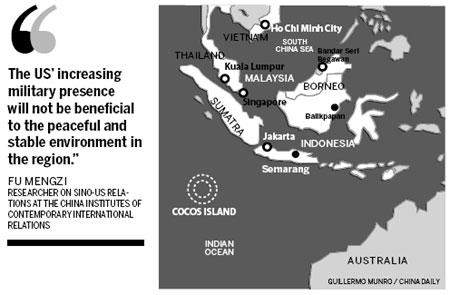Asia-Pacific nations 'need to work together'
Updated: 2012-03-29 08:08
By Li Lianxing (China Daily)
|
|||||||||

China recognizes that peace, development and cooperation are common aspirations and trends in the Asia-Pacific region, and all related countries should work together to achieve regional security, the Foreign Ministry said.
Ministry spokesman Hong Lei made the remarks at a regular news briefing on Wednesday when asked about the United States' plan to operate spy flights in Australia's remote Cocos Islands territory.
"We hope the region's relevant countries can uphold the new security concept of equality, common development, coordination, mutual benefit and try to uphold safety for all, and relevant countries should adapt to this trend," he said.
According to the Washington Post, the Pentagon is interested in setting up a new base for surveillance aircraft in the Cocos Islands, a series of atolls about 3,000 kilometers west of Australia and south of Indonesia.
This prospective new base will allow US spy flights over the South China Sea.
Australian Defense Minister Stephen Smith confirmed on Wednesday that Australia may eventually allow this to happen, but said the proposal was not under active consideration and was not among current plans for Canberra to strengthen military ties with Washington.
"We view Cocos as being potentially a long-term strategic location. But that is down the track," Smith told reporters on Wednesday.
Fan Jishe, a researcher with the Chinese Academy of Social Sciences, said it's difficult to determine whether the US' plan is aimed at spying in the South China Sea, as the Territory of Guam could already play the role.
"Australia doesn't want to be involved in any military confrontation between China and the US in this region, given that it's the firmest ally of the US in the region and China is already its biggest trading partner," he added.
"The US' increasing military presence will not be beneficial to the peaceful and stable environment in the region," said Fu Mengzi, a researcher on Sino-US relations at the China Institutes of Contemporary International Relations.
He said there is no so-called "intense" atmosphere among great powers in the Asia-Pacific region, and this intensity shouldn't be developed in the future.
"When the US is considering increasing its military precense in the region, it also must consider its economic and business ties with Asia-Pacific countries," he said, adding that the US will have a more active relationship with Asia while Australia's future increasingly relies on its cooperation with Asian countries.
In November, US President Barack Obama outlined his pivot to Asia and agreement with Canberra for a de-facto base for 2,500 marines near the northern city of Darwin.
They also agreed to allow greater US air force access to northern Australian bases, and to give the US navy greater access to an Indian Ocean naval base in Perth.
Smith said Australia has been open with China about its plans, which will likely include moving more military assets to the country's north to protect resource projects.
Reuters contributed to this story.
lilianxing@chinadaily.com.cn

 Relief reaches isolated village
Relief reaches isolated village
 Rainfall poses new threats to quake-hit region
Rainfall poses new threats to quake-hit region
 Funerals begin for Boston bombing victims
Funerals begin for Boston bombing victims
 Quake takeaway from China's Air Force
Quake takeaway from China's Air Force
 Obama celebrates young inventors at science fair
Obama celebrates young inventors at science fair
 Earth Day marked around the world
Earth Day marked around the world
 Volunteer team helping students find sense of normalcy
Volunteer team helping students find sense of normalcy
 Ethnic groups quick to join rescue efforts
Ethnic groups quick to join rescue efforts
Most Viewed
Editor's Picks

|

|

|

|

|

|
Today's Top News
Health new priority for quake zone
Xi meets US top military officer
Japan's boats driven out of Diaoyu
China mulls online shopping legislation
Bird flu death toll rises to 22
Putin appoints new ambassador to China
Japanese ships blocked from Diaoyu Islands
Inspired by Guan, more Chinese pick up golf
US Weekly

|

|







